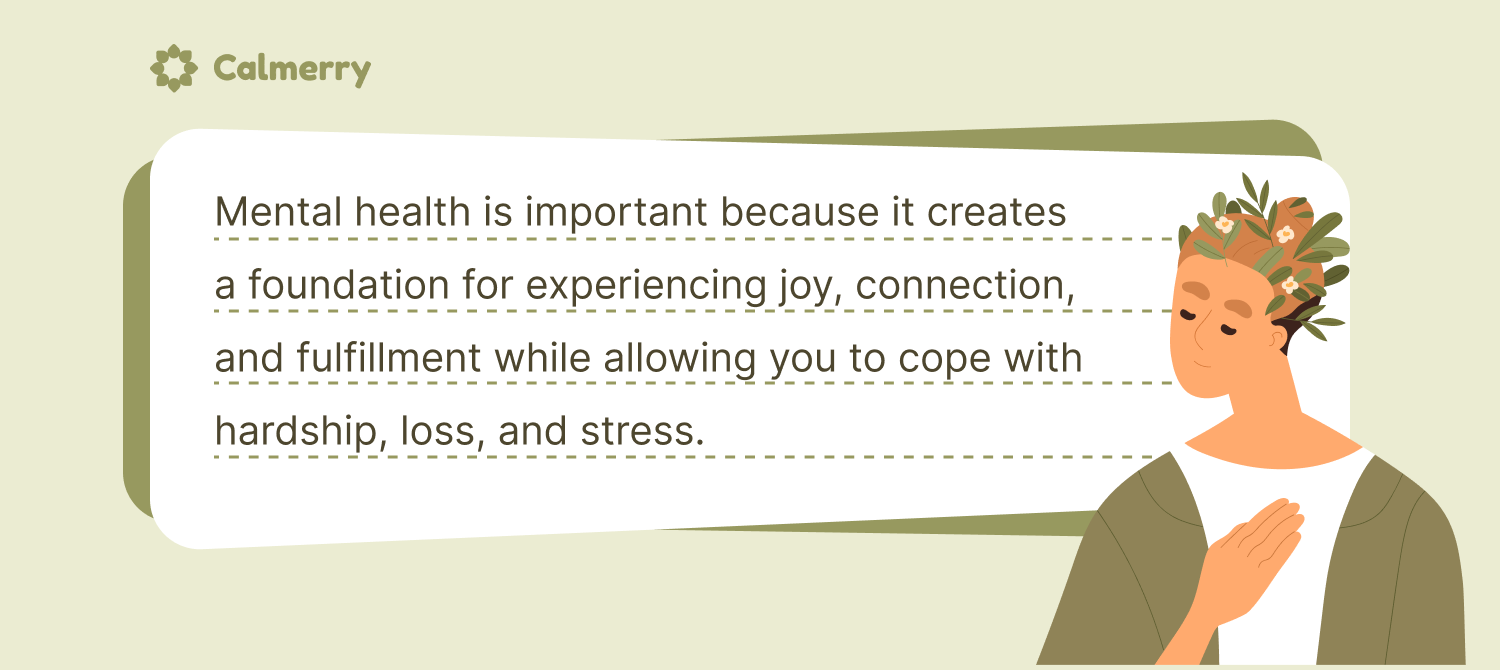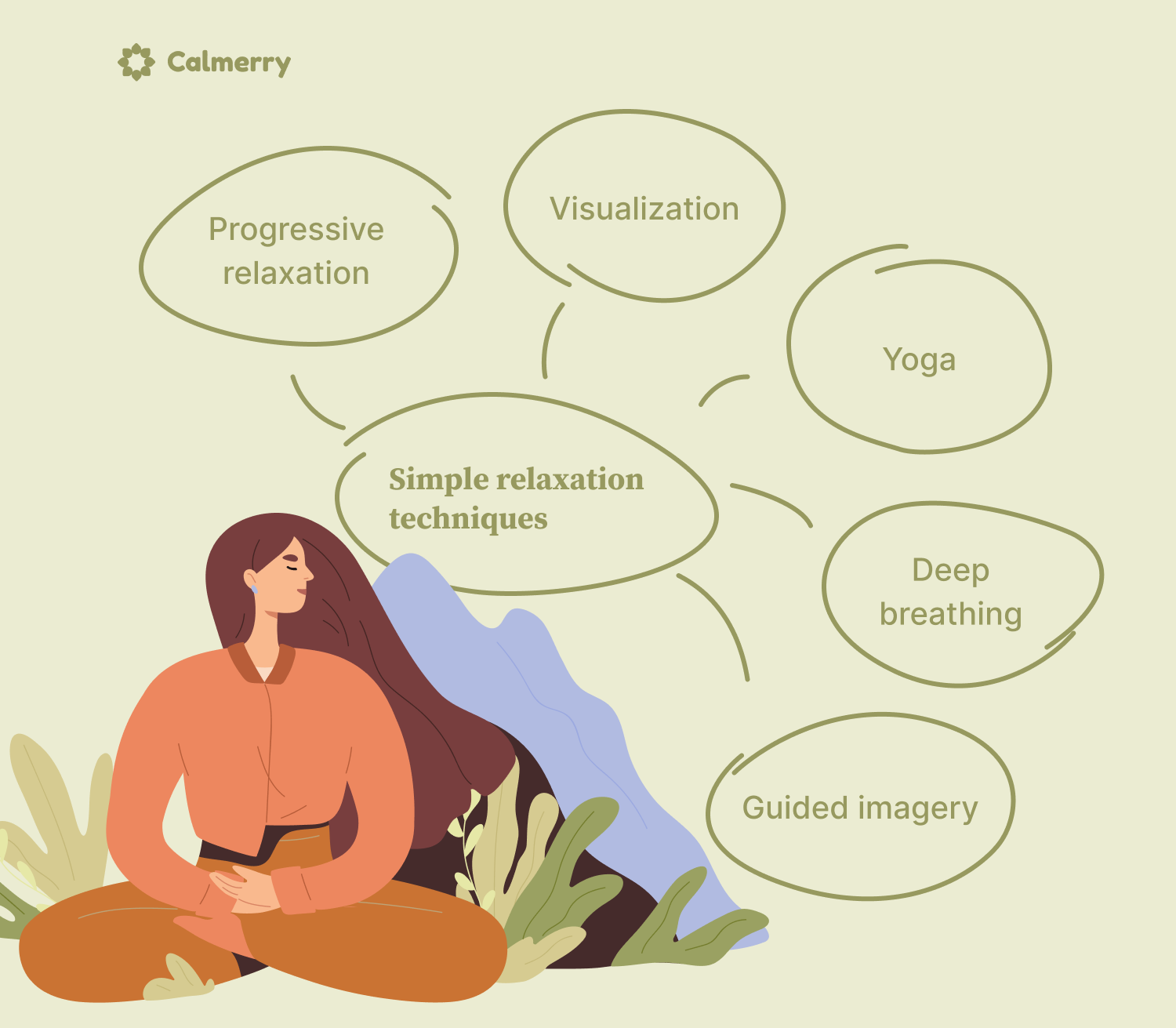11 Tips to Improve Your Mental Health Right Away

In this article
We throw the term “mental health” around a lot, but what exactly do we mean by it? Simply put, mental health is everything that has to do with your emotional, psychological, and social well-being. It affects your actions, thoughts, and feelings. And it can completely shift the way you engage with and experience the world.
Like your physical health, some aspects of your mental health are within your control, and some aren’t. Your mental health may also change over time (and from minute to minute), depending on multiple factors, including your genetics, brain chemistry, childhood experiences, current relationships, sense of connection, and life stressors.
Mental health is important because it creates a foundation for experiencing joy, connection, and fulfillment while allowing you to cope with hardship, loss, and stress.
When a person is in good mental health, they will:
- Have an overall sense of contentment
- Be able to laugh and enjoy themselves
- Feel a sense of meaning or purpose in their activities or relationships
- Be able to adapt and cope with change
- Have supportive and sustained relationships
- Be self-confident
This doesn’t mean they won’t experience any hardship and disappointment or feel difficult emotions familiar to most humans. Still, they’ll have more resilience to cope with life’s challenges.
Signs of poor mental health
When a person’s mental health is under strain, they may begin to:
- Withdraw from their friends and family
- Stop going to work or attending classes
- Feel depleted of energy
- Feel numb or emotionally exhausted
- Have aches or pains that aren’t explained by another issue
- Feel hopeless
- Drink more alcohol or use other drugs more frequently
- Feel forgetful and confused
- Be extra irritable
- Have mood swings
- Worry a lot
- Get into fights with people
- Struggle with their relationships
- Get stuck in their head
- Eat a lot or not enough
- Sleep more than usual or have insomnia
- Hear voices or see things that aren’t there
- Think about self-harm or hurting others
What is a mental disorder?
A person can struggle with their mental health without having a mental disorder.
A mental disorder is a diagnosable mental health condition that involves significant changes in a person’s thinking, emotions, or behavior which create distress and get in the way of their functioning.
Mental disorders are very common. One in five Americans experience a mental disorder each year, and one in 25 has severe problems like bipolar disorder, major depression, or schizophrenia.
There isn’t a single clear cause of mental disorders, though there are risk factors, including:
- Early adverse childhood experiences (sometimes called ACEs)
- Stress related to poor physical health or illness
- Feelings of loneliness or isolation
- Genetics
- Chemical imbalances in the brain
- Substance use
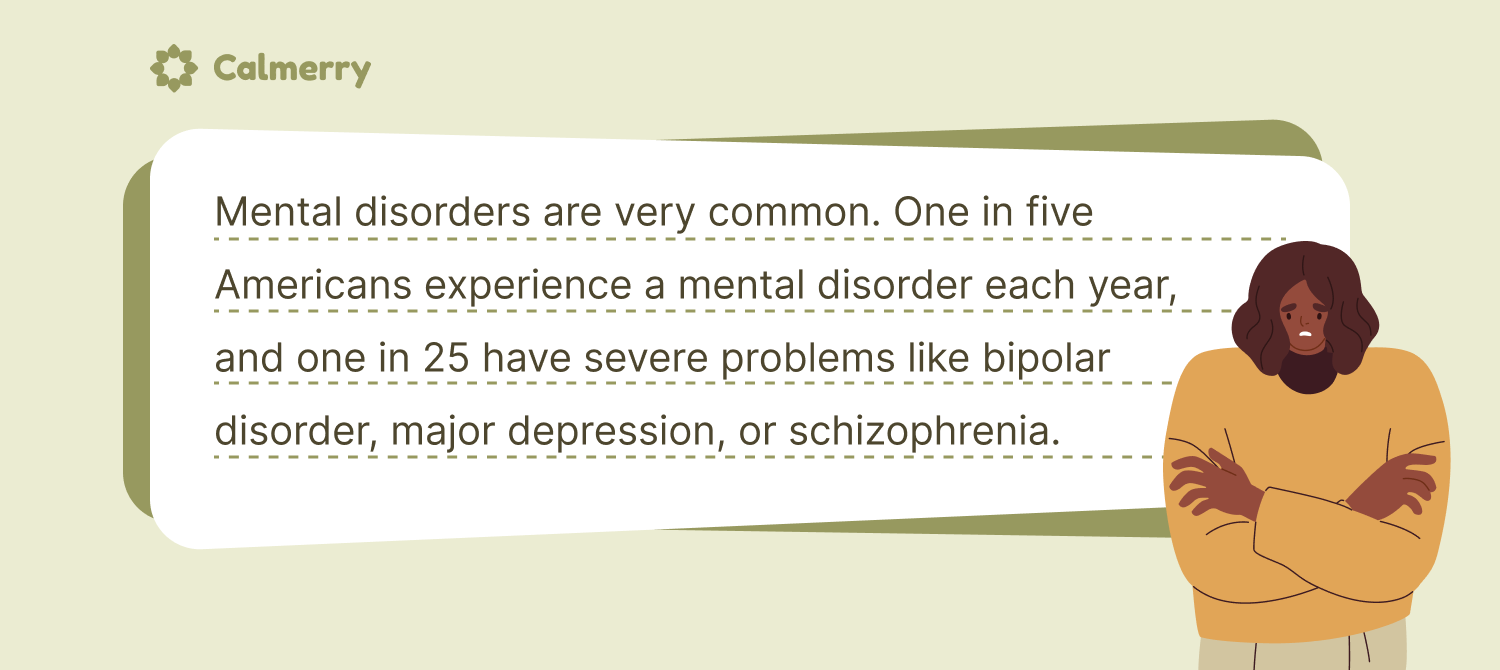
How to take care of your mental health
At some point or another, most of us experience difficulties associated with mental health. Some people might try to distract themselves with things like social media, use unhealthy coping practices, like alcohol, or push through it in hopes that it would resolve on its own.
The problem is, none of these tactics typically work. In fact, they can have the opposite effect.
But there’s good news – you don’t have to stay stuck. There are things that you can do on a regular basis to improve your mood and strengthen your mental health. They’re not quick fixes for the most part, so it’s important to build them into your life in a sustainable way.
Below are 11 ways you can strengthen your mental health.
1. Be kind to yourself
When you’re struggling with your mental health, it’s easy to get down on yourself. You may wonder why you can’t just “snap out of it” or notice that your self-esteem has plummeted.
You don’t have to stand in front of a mirror and give yourself compliments. That probably wouldn’t feel very authentic, and it wouldn’t do you much good anyway. But try being compassionate toward yourself.
Imagine you had a dear friend who was going through the same thing that you are. What would you say to them, and how would you comfort them? Try turning that compassion back toward yourself. You deserve it!
2. Practice mindfulness
Some days are going to be better than others, that’s just how life works. With mindfulness practices, you can develop your capacity to take each day as it comes. To do this, you don’t have to sit in a lotus pose for an hour every day if you don’t want to – mindfulness can be infused into your life through everyday activities.
Zen master and peace activist Thich Nhat Hanh has written about using mindfulness while completing the commonly dreaded daily act of washing the dishes. In his book Peace is Every Step, he wrote:
“To my mind, the idea that doing dishes is unpleasant can occur only when you aren’t doing them. Once you are standing in front of the sink with your sleeves rolled up and your hands in the warm water, it is really quite pleasant. I enjoy taking my time with each dish, being fully aware of the dish, the water, and each movement of my hands.”
He goes on to write:
“If I am incapable of washing dishes joyfully, if I want to finish them quickly so I can go and have dessert, I will be equally incapable of enjoying my dessert. With the fork in my hand, I will be thinking about what to do next, and the texture and flavor of the desert, together with the pleasure of eating it, will be lost. I will always be dragged into the future, never able to live in the present moment.”
Throughout your day, see if there are moments when you can be fully present. Notice your thoughts and feelings without judging them, notice the sensations in your body. Each time you do this, you’re strengthening your awareness, which in turn improves your mental health.
3. Use relaxation techniques
Developing an ability to turn on your body’s natural relaxation response can help you become more resilient against stress. When your breathing slows down and your muscle tension releases, you’ll feel the effects in both your mind and body.
A huge benefit of relaxation techniques is that they’re free and can be done almost anywhere. Your therapist can work with you to explore certain relaxation techniques, and you can also try them out on your own. There are many techniques to choose from, so try a few and see if you can find one (or two) that would fit into your everyday life so you can practice regularly.
A few relaxation techniques to consider include:
- Progressive relaxation: This involves slowly tensing and relaxing muscles throughout your body. You might start with a toe, tensing for five seconds and relaxing for 30 seconds, and slowly moving through your entire body up to your head.
- Guided imagery or visualization: Imagine something beautiful, calm, and serene. It might be grass blowing in the field, a blooming flower, or a calm mountain lake – really, anything that is soothing for you. Try to experience the visualization with all of your senses, the feeling of the grass beneath your bare feet, the fragrance and sounds.
- Yoga: This ancient practice of movement coupled with breathwork can bring balance and stress reduction. There are many styles of yoga, and it’s nearly always possible to find a class for any level, either in person or online.
- Deep breathing: If your health allows, inhale and exhale with long, slow, deep breaths from your belly. Some people also benefit from “square breathing,” which involves counting to four on their inhale, holding the breath for four, exhaling for four, and then resting for four.
4. Spend time in nature
You may have heard the term “forest bathing” and wondered what it was. It sounds pleasant and a bit majestic, right? Originally from Japan, forest bathing or Shinrin-yoku (森林浴) means “taking in the forest through our senses.” There’s no actual bath involved. Instead, it’s the act of bathing your senses in nature.
Researchers have found that spending time in the forest can benefit your mental health. For example, walking in forests, compared to urban centers, has been shown to buffer against depression, anxiety, and exhaustion. While you’re at it, it may also boost your immune function and improve your heart health.
For the many of us who live in cities and don’t have regular access to a forest, try spending time with nature in the way that you can. It might be going to the beach, strolling in a neighborhood park or a small garden, watching the changing colors of the sunset, looking at a snow-filled landscape, or even observing the grass growing between cracks in the sidewalk.
5. Get enough sleep
Of all ten tips, we can get the most bang for our buck by making sure we’re getting our recommended 7 to 9 hours of sleep each night. There’s a lot to do each day, and sleep might seem like the first thing to cut if you can’t fit it all in. However, that’s the absolute wrong move for both your mental and physical health.
Losing even an hour of sleep can take a large toll on your mood, energy, ability to concentrate, and resilience. If you’re like me and it takes you a while to fall asleep after you lay down, try giving yourself more time to unwind before you end each day.
Turn off your screens, wrap up your work, and eat your last snack at least two hours before you plan to be asleep. You may also want to keep the same general wake-up time each day of the week. This is true whether you’re a night owl with a late wake-up time or an early bird who wakes up at 6 AM.
6. Pick up your journal
People have been writing in journals for at least a thousand years. Men and women of the 11th-century Japanese court kept “pillow books” in their sleeping quarters. In the 21st century, scientists began to study the benefits of journaling for mental health.
There are several reasons why journaling is good for you. It improves your emotional health by creating a space to express your emotions that otherwise might get stuffed down. It also helps you organize your experiences into a coherent narrative.
If journaling repels you, take heart in knowing that you don’t have to write for hours at a time to reap the mental health benefits. Try writing for just 10 minutes a day, one or two days per week. You can free-write about the day, a memory from your childhood, your goals, an experience at work, or your dream trip – any topic is fair game. You’ll probably find that you start with one topic and end up on a totally separate topic when the 10 minutes are up.
The one caveat is that if you find yourself writing about something painful, try to spend a few minutes of your time exploring ways that you’ve coped (or would like to cope). And if you’re often writing about things that are bothering you, leave aside a couple of minutes to brainstorm how you might like to deal with the situation moving forward.
7. Exercise
Exercise can be a discouraging word. We all know that it’s good for us, and most of us wish that we were getting more of it, but can’t seem to find the time or energy to squeeze it in.
Not to pile on here, but did you know that exercise can improve your mental health as much as your physical health? Amazingly, physical activity can actually change the chemical balance in your brain and promote feelings of contentment, optimism, and joy.
The key to exercise is that it doesn’t always mean going to the gym or doing a grueling workout. In fact, getting yourself moving for 30-60 minutes, three to five times per week, has the potential to make a substantial impact on your mental and physical health.
If you’re just getting started, focus on activities that you enjoy and that you can sustain, such as taking a brisk walk at lunch, working in the yard, going for a bike ride, or dancing to your favorite music in your bedroom.
8. Nurture your relationships
Fellow introverts among us, I know what you’re thinking: “But being around other people actually drains me.” The truth is, even the most introverted people need to be seen, heard, and understood by – and also see, hear, and understand – other humans.
Humans are social creatures, which makes it very difficult for us to thrive alone. Connecting to others is not as easy as it was before the pandemic, but it’s still possible. If you’re feeling lonely, get creative and write someone a letter or send them a personal video asking for a reply.
It’s important to say what you need. You can reach out to a friend to let them know that you’re craving connection and you’d like to talk. If you want to build your social network, get out of your comfort zone a little by volunteering for a cause you’re interested in, taking a class, or starting a neighborhood cleanup.
Acts of kindness and selflessness can have the added bonus of improving your mental health by filling you with positive feelings and adding to your sense of self-worth while doing good for the world.
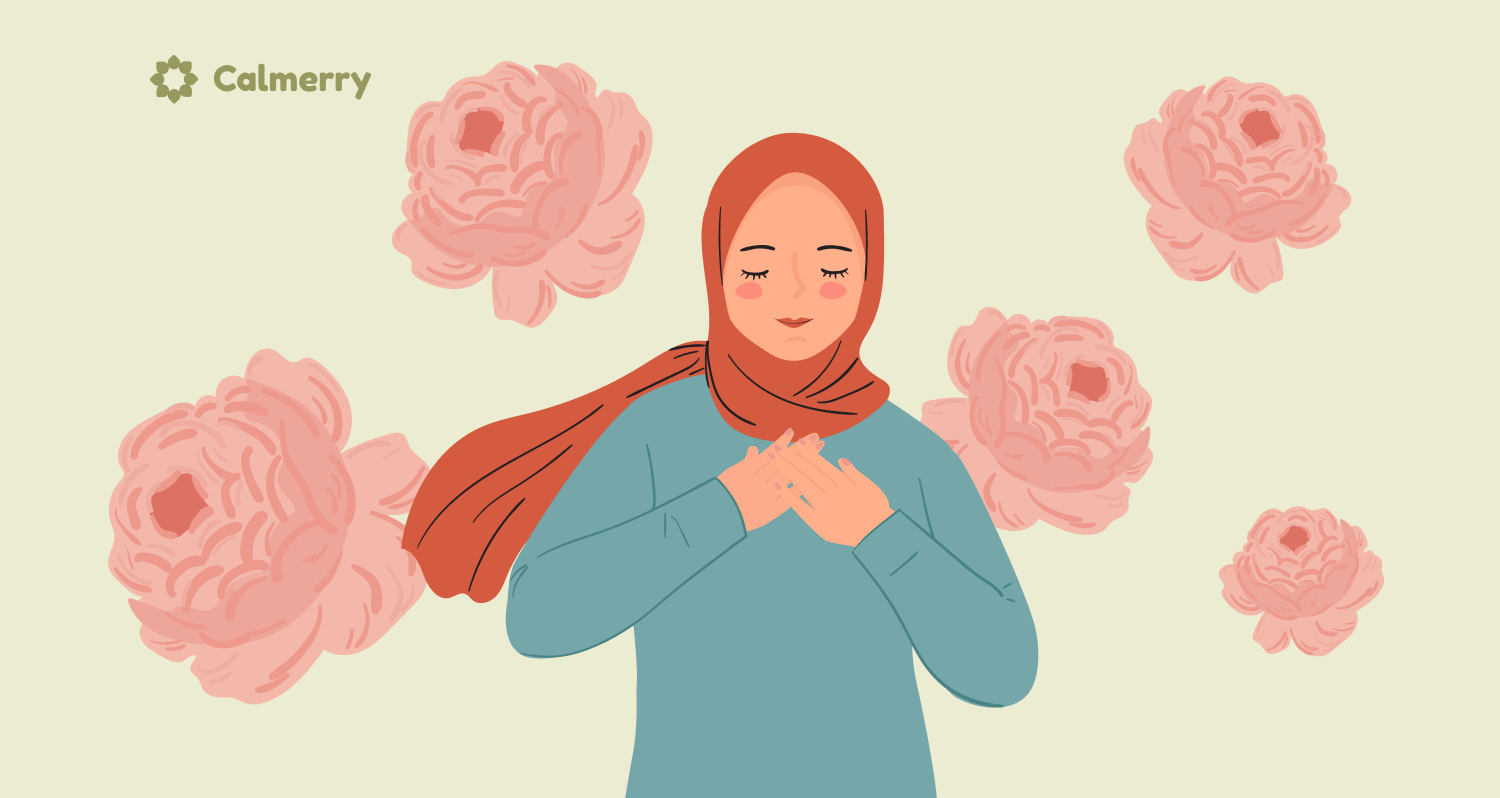
9. Practice gratitude
When you reflect on your week, it’s easy to remember the things that went wrong: you were late for a meeting, you ate more than you wanted to, or your best friend didn’t text you back. But what about the things that are going well in your life?
Gratitude is necessary for balancing negatives and positives. Setting the intention to notice a few positive things each day can promote your emotional health. Hundreds of studies on gratitude have found that even in hard times, gratitude can reduce anxiety and depression, bring a feeling of happiness, improve your overall health and sleep, and strengthen your relationships.
If you’re heartbroken and just lost your job, it’s not to deny the pain and fear that you may be feeling, but to also take space to recall, “my coffee tastes so good in the morning,” or “my favorite part of today was snuggling with my cat.”
10. Learn what self-care means for you
Self-care and mental health go hand in hand. While each person has their own definition of what it means to them, ultimately, self-care comes down to making space for yourself. You might use the space to listen to music, create music, craft, make gifts for your friends, color, cook, bake, look out the window, or read a good book. The possibilities are endless.
If you’re not sure what makes you feel good, try learning something new that interests you. This can boost your self-confidence and help you connect with others. Maybe you’ll try a new recipe, explore a new project at work, DIY something at home, or learn a new language or skill. If there’s something out there that intrigues you, go for it.
11. Start therapy
Therapy is not just for people who are struggling with their mental health; it’s for everyone. When you connect with a therapist, they join your team with the goal of strengthening your mental health so you can fully experience your life.
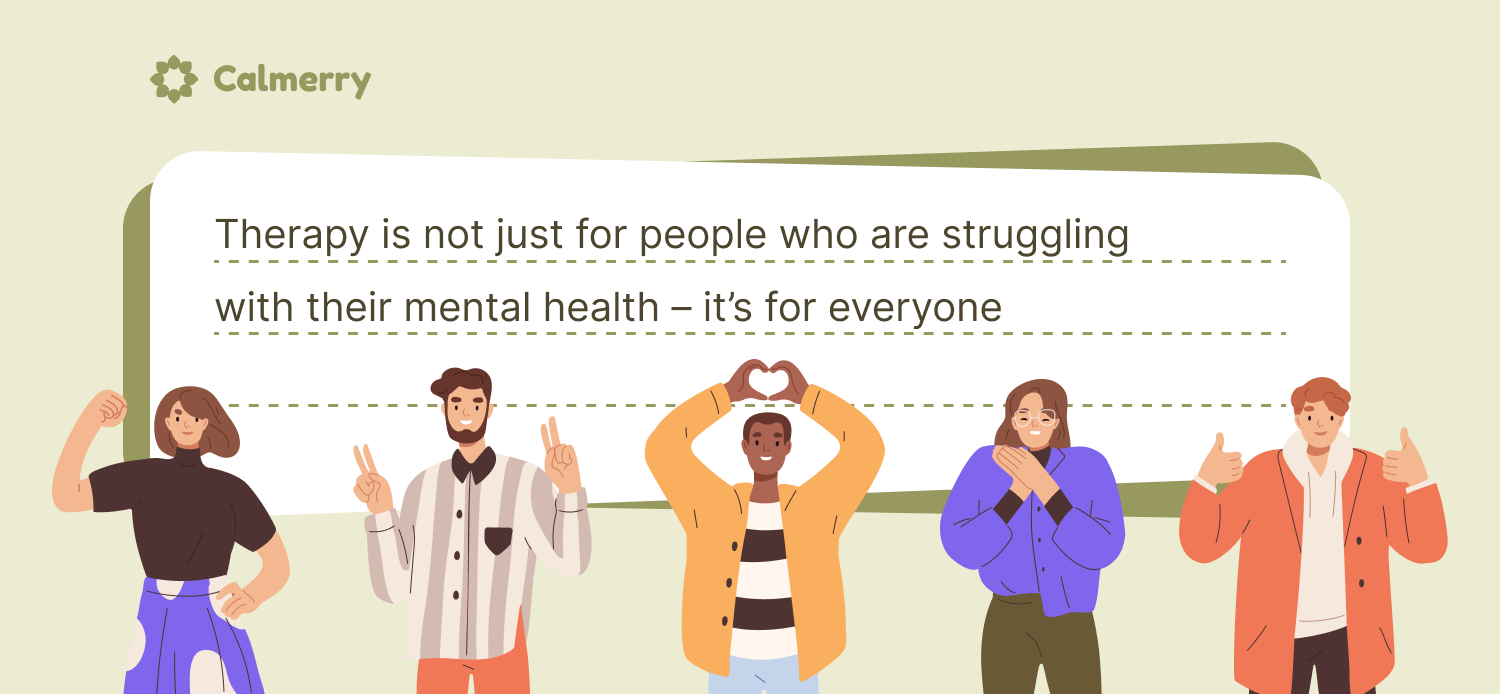
There are many types of therapy. In psychodynamic therapy, you may explore your unconscious, while in cognitive behavioral therapy, you may engage in role plays and use thought records to move towards concrete goals. Regardless of the therapeutic modality, you’ll work with your therapist to develop a sense of meaning and purpose as you strengthen your ability to cope with new skills and insights.
You can try online therapy from the comfort of your own space and access a supportive therapeutic relationship to explore big questions, such as “what is the meaning of my life,” and concrete questions, like “what do I want to say to my boss on Monday?” There’s no one right way to approach therapy. What’s important is that it resonates with you.
Final thoughts
If you feel bad or depleted, it only makes sense to want to feel better ASAP. But when you’re struggling with your mental health, your ability to focus and concentrate can disappear, and your stamina will likely be a lot lower than you’d hope.
Manage your expectations and set realistic goals for yourself. You might start by using Calmerry to name one positive thing that happened at the end of each day and noting it down or taking a walk around the block. When you make slow and incremental changes with the support of Calmerry, you’re much more likely to sustain them.
online therapy
live video session

